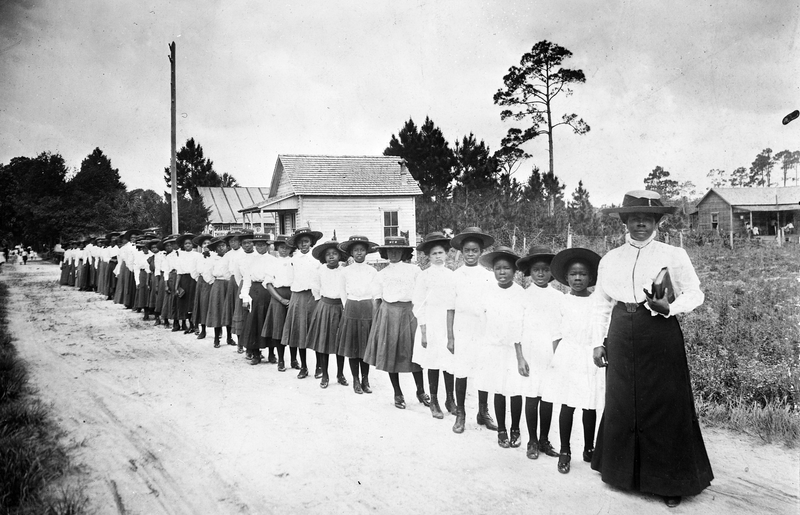
Civil rights activist Mary McLeod was a school choice pioneer, opening a private, faith-based school for African-American girls in Daytona in 1904. The state of Florida may honor her with a statue in the U.S. Capitol. (Image from Wikimedia Commons.)
This is the latest in our series on the center-left roots of school choice.
How fitting: The choiciest of school choice states may soon be represented in the U.S. Capitol by the statue of a school choice pioneer.
A state panel nominated three legendary Floridians for the National Statuary Hall last week, but the only unanimous choice was Mary McLeod Bethune. The civil rights activist and adviser to President Franklin D. Roosevelt is best known for founding the private, faith-based school that became Bethune-Cookman University.
Assuming the Florida Legislature gives the Bethune statue a thumbs up too, more people, including millions of tourists who visit the hall each year, may get to hear her remarkable story. And who knows? Maybe they’ll get a better sense of the threads that tie the fight to educational freedom in Bethune’s era to our own.
With $1.50 to her name, Bethune opened the Daytona Educational and Industrial Training School for Negro Girls in 1904. There were public schools for black students in early 1900s Florida, but they were far inferior to white schools.
Bethune’s vision for something better was shaped by her own educational experience.
She attended three private, faith-based schools as a student. She taught at three private, faith-based schools before building her own. In every case, support for those schools, financial and otherwise, came from private contributions, religious institutions – and the communities they served. Backers were motivated by the noble goal of expanding educational opportunity. Black parents ached for it. That’s why, in the early days of her school, Bethune rode around Daytona on a second-hand bicycle, knocking on doors to solicit donations. That’s why her students mashed sweet potatoes for fund-raiser pies, while Bethune rolled up the crust.
Failure was not an option, because failure would have meant no options.
Goodness knows, I’m no expert on Mary McLeod Bethune. But given what I do know, I think she’d be amazed at the freedom that today’s choice options offer to educators. More and more teachers, especially in choice-friendly states like Florida, are now able to work in or create schools that synch with their vision and values – and get state-supported funding to do it.
Bethune was forever hunting dollars to keep her school afloat, and it wore her down. In 1902, she asked Booker T. Washington for money. In 1915, she asked philanthropist and civil rights advocate Julius Rosenwald for money. In 1920, she made a pitch on the letters page of the New York Times. (All of this can be found in “Mary McLeod Bethune: Building a Better World,” a nice collection of Bethune’s writing.)
In 1941, Bethune even asked FDR. “I need not tell you what it has meant in Florida to try to build up a practical and cultural institution for my people,” she wrote to the president. “It has taken a wisdom and tact and patience and endurance that I cannot describe in words.”
“We are now in desperate need of funds,” she continued. “My nights are sleepless with this load upon my heart and mind.”
I can’t help but wonder what a superhero like Bethune could have done, had Florida had vouchers and tax credit scholarships a century ago. I don’t mean to dismiss the inequity in funding for choice programs – it’s real, and it deserves more attention – but inequity is relative. The funding streams available for low-income students today would have allowed Bethune to park the bike, forget the pie crust and focus on her core mission.
It would also have allowed her to rally more to the cause.
Bethune, who initially hoped to be a missionary, understood how much education and faith are intertwined for so many parents, and that it doesn’t make sense to pit public against private, or one school against another.
In 1932, she weighed in on a feud between state teacher colleges with an essay that foreshadows the all-hands-on-deck views of many of today’s choice supporters. She referenced the massive number of truant African American students and the “pitiful handful” that graduate from high school. “Unfriendly rivalry was never more needless, never more inexpedient among the schools of Florida than just now,” Bethune wrote.
The same could be said for K-12 education today.
Somehow, though, Bethune managed to end her essay on an up note, with an appeal to common ground:
Florida faces a new day in education. Grim as the picture appears today, it is not nearly so bad as it was just a few years hence, and the aspect is rapidly changing for the better; a veritable miracle is transpiring before the eye. The day for which many warriors now aging in the service have longed, the day for which they have prayed and sweat drops of blood – that new day of the hoped-for better things is approaching. With the scent of victory in the nostril, may every agency redouble its zeal; with jealousies forgotten, with the spirit of competition thrust aside, may every organization and individual unite under the banner of One Common Cause, the grim battle against ignorance and vice, and carry the issue to a glorious victory.